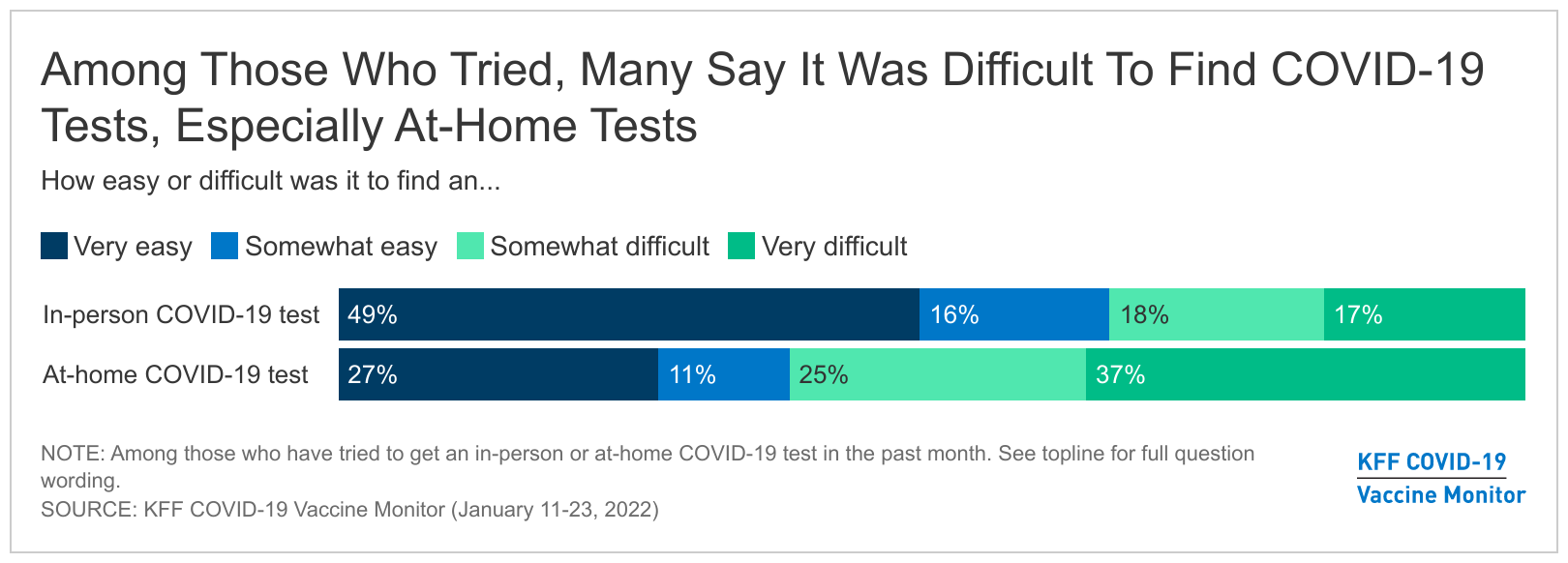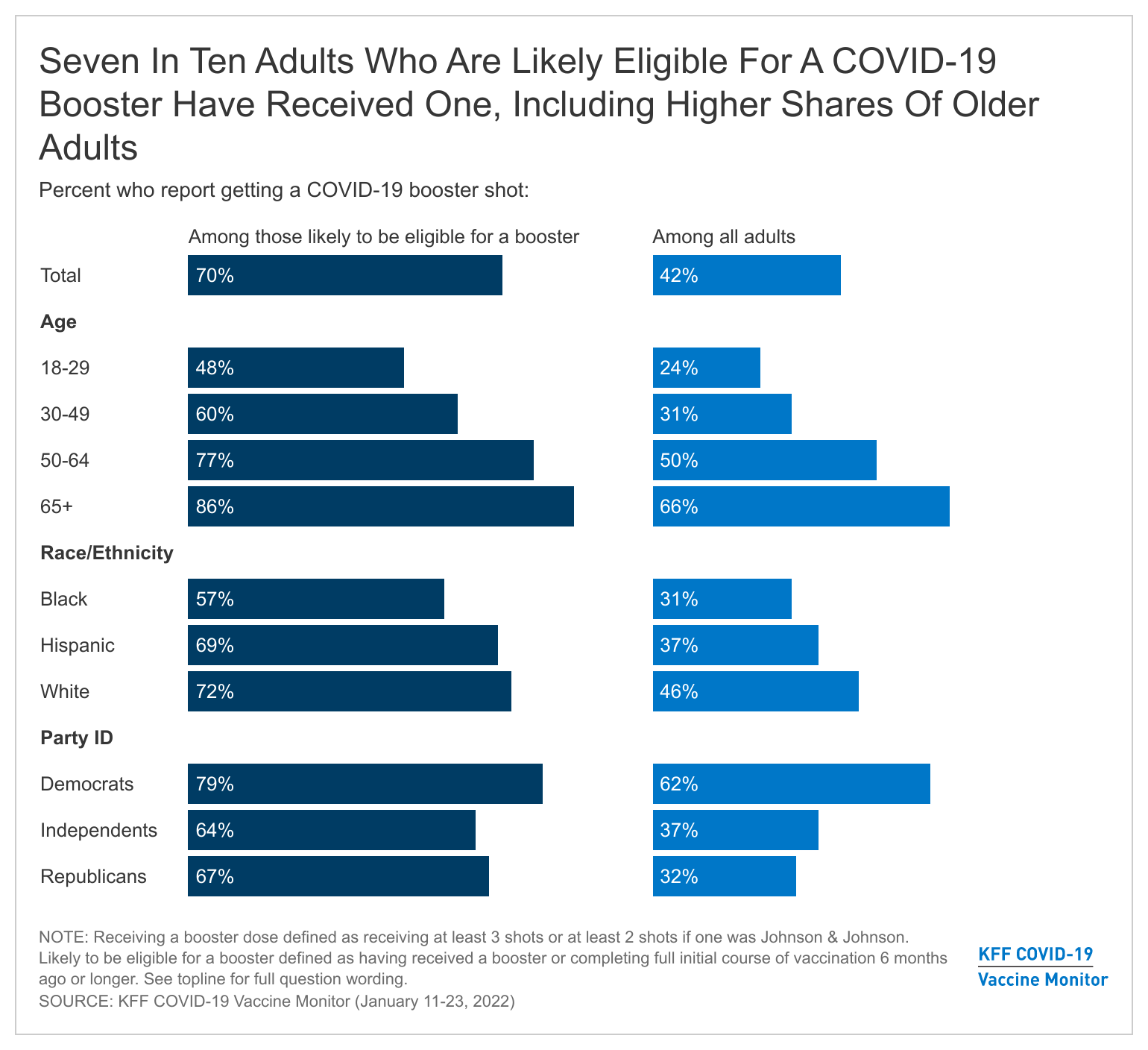
The independent source for health policy research, polling, and news.
42% of Adults, and 70% of Those Likely Booster-Eligible, Now Say They’ve Gotten a COVID-19 Booster Shot; The Share Who Received At Least One Dose Inches Up to 77% in Omicron’s Wake
6 in 10 Who Tried to Purchase an At-Home Test and a Third Who Sought an In-Person Test Say It Was Difficult to Find, Though Most Were Eventually Able to Get a Test
Black and Hispanic Adults are More Likely Than White Adults to Worry About Omicron’s Effects, Including Becoming Seriously Ill or Missing Work Due to Infection
The latest KFF COVID-19 Vaccine Monitor report shows that 42% of all adults nationwide have received a COVID-19 booster and more than three quarters (77%) have received at least one dose of a COVID-19 vaccine, up slightly since November (73%) before the omicron variant triggered a surge in cases, hospitalizations and deaths.
The small shift comes after vaccination rates stagnated in the fall but leaves relatively few unvaccinated adults who are open to getting a shot. Just 1% plan to do so right away, 4% want to wait and see how it works for others, and 3% who say they would only do so if required for work, school or other activities. About 1 in 7 adults (14%) say they “definitely will not” get a vaccine, a share that is largely unchanged since December 2020.
The survey also finds most vaccinated people are getting recommended booster shots. Overall, 42% of the public (and 55% of all vaccinated adults) say they’ve received a booster dose.
Mirroring their early uptake of the initial vaccine, two thirds (66%) of all adults ages 65 and older and half (50%) of adults ages 50-64 received a booster. Similarly, Democrats (62%) are more likely than independents (37%) and Republicans (32%) to have received a booster.
Among the population likely to be booster-eligible (those who either received a booster or completed a full initial course of vaccination at least 6 months ago), 7 in 10 (70%) have gotten a booster. This rises to 86% among those ages 65 and over and 77% among those ages 50-64 who are likely booster-eligible.
Across racial and ethnic groups, White adults (46%) are more likely than Black (31%) and Hispanic (37%) adults to have received a booster. This may at least partially reflect some Black and Hispanic adults not yet being eligible for a booster if their initial course of vaccination was completed recently. However, there is evidence that booster uptake and access may be lagging among the booster-eligible population of Black adults. Among the likely booster-eligible population, 57% of Black adults compared with 69% of Hispanic adults and 72% of White adults have gotten a booster.
Amid the Omicron Surge, Many Report Challenges to Accessing COVID-19 Tests
With COVID-19 cases surging to unprecedented levels, nearly half (48%) of adults say that in the past month they tried to get either an in-person COVID-19 test (33%) and/or an at-home test (28%).
Fielded as the Biden administration began to encourage more widespread testing and put forward policies to improve access, the report highlights people’s struggles to obtain tests when needed.
While most (65%) who tried to find an in-person test in the past month say it was easy to do, a third (35%) say it was difficult. Rapid at-home tests presented even more of a challenge, with most (62%) who tried to get one saying it was difficult and a little more than a third (38%) saying it was easy.

Importantly, the vast majority (89%) of those who attempted to get an in-person COVID-19 test in the past month say they were able to get one. Still 11% of those who tried to get such a test (4% of all adults) say they were unable to get an in-person test, and 23% (7% of all adults) say they had to wait two days or more to be tested.
One-third of those who tried to get an at-home test (9% of all adults) say they were unable to get one, mainly because tests were not available rather than being too expensive (91% vs. 2% among those who tried but could not get an at-home test).
When asked who is responsible for the limited availability of COVID-19 tests, about half say the U.S. Food and Drug Administration (FDA) deserves at least a fair amount of blame. Slightly fewer think President Biden (44%) or test manufacturers (41%) deserve at least a fair amount of blame. The survey was in the field when President Biden announced that people could begin to order free at-home tests on January 19.
Black and Hispanics Adults Are More Worried than White Adults About Omicron’s Impact on Them
About 4 in 10 adults (42%) say they are at least somewhat worried about getting the omicron variant, though fewer worry about having to miss work (36%), becoming serious ill (34%), or being hospitalized (27%) as a result of a coronavirus infection.
Black and Hispanic adults, as well as people with lower incomes, are more likely to worry about each of these. For example, most Hispanic (59%) and Black (54%) adults say they are worried about becoming infected with the omicron variant, while about a third (35%) of White adults are. Similarly, Hispanic (57%) and Black (43%) adults are much more likely than White (27%) adults to say they are worried about missing work due to an infection.
Two Years into the Pandemic, Most of the Public is Tired and Frustrated
Two years into the pandemic, three quarters of the public say they are both tired (75%) and frustrated (73%) by the state of the pandemic, with more than 7 in 10 Democrats, Republicans and independents reporting these emotions. Fewer people say they are optimistic (42%), angry (40%) or confused (29%).
In addition, a large majority (77%) also says it is inevitable that most people across the country will get COVID-19 eventually. This includes similar shares among those who are vaccinated (77%) and those who are not (74%), as well as among Democrats (74%), independents (78%) and Republicans (78%).
Despite widespread reports of vaccinated people testing positive for the omicron variant, a substantial majority (62%) say they believe the vaccines are working because “most vaccinated people who become infected with COVID-19 do not require hospitalization.”
Far fewer (34%) say the vaccines are not working because “some vaccinated people are becoming infected.” The share who see these breakthrough infections as a sign the vaccines are not working has increased slightly since September (26%), driven by shifts among Republicans and unvaccinated adults.
A third (34%) of the public currently views the pandemic as the country’s biggest problem, slightly more than the share who say rising prices due to inflation (28%) is the biggest problem. Fewer identify climate change (9%), racial inequality (8%) crime (6%) or shortages due to supply-chain issues (5%).
Partisans rank these problems differently, with three times as many Republicans (44%) as Democrats (13%) saying inflation is the nation’s biggest problem, and more than twice as many Democrats (51%) as Republicans (19%) saying the pandemic is. Roughly equal shares of independents name inflation (30%) and the pandemic (28%) as the nation’s biggest problem.
Other highlights include:
- Nearly a quarter (23%) of adults nationwide say they’ve personally tested positive for COVID-19 at some point during the pandemic, including 8% who say they’ve tested positive in the past month. Among those who tested positive in the past month, 16% (representing 1% of all adults) say they used only an at-home test, indicating the result is unlikely to be captured on official case counts.
- About 1 in 5 adults (19%) say they’ve personally had difficulty in the past few months figuring out whether they needed to isolate or limit their normal activities either after being exposed to COVID-19, receiving a positive test result, or experiencing symptoms. Most (58%) say federal public health authorities’ guidelines for testing and isolation are confusing.
- Most of the public says that COVID-19 vaccinations should be required for people traveling on airplanes internationally (62%) and domestically (55%). Majorities of Democrats and independents support such requirements, though most Republicans do not.
- About 7 in 10 (71%) adults say they worry that restrictions aimed at stopping the spread of omicron will hurt local businesses in their area. Majorities across partisans express worry about the impact of restrictions on local businesses.
Designed and analyzed by public opinion researchers at KFF, the KFF Vaccine Monitor survey was conducted from January 11-23, 2022 among a nationally representative random digit dial telephone sample of 1,536 adults. Interviews were conducted in English and Spanish by landline (165) and cell phone (1,371). The margin of sampling error is plus or minus 3 percentage points for the full sample. For results based on subgroups, the margin of sampling error may be higher.
The KFF COVID-19 Vaccine Monitor is an ongoing research project tracking the public’s attitudes and experiences with COVID-19 vaccinations. Using a combination of surveys and qualitative research, this project tracks the dynamic nature of public opinion as vaccine development and distribution unfold, including vaccine confidence and hesitancy, trusted messengers and messages, as well as the public’s experiences with vaccination.
